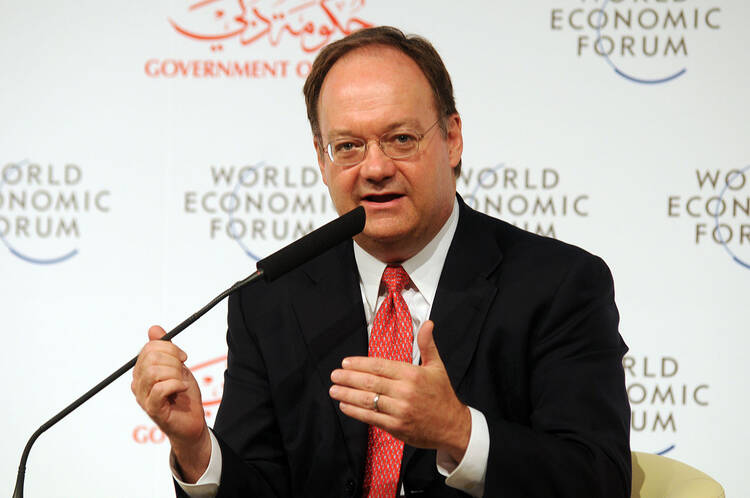This is part three of a three-part series on Catholic colleges and universities led today by lay leaders after a history of priests or women religious at their helms. Read Part 1 on Trinity University Washington here and part 2 on the Catholic University of America here.
Questions focused on the challenges lay leaders face related to Catholic mission and identity. Presidents Patricia McGuire of Trinity and Garvey of CUA answered questions individually. President John J. DeGioia of Georgetown provided a statement he made in 2012, “Reflections on Our Way of Being an American Catholic and Jesuit University,” at a Joint Board Leadership Meeting, Washington.
It was a profound honor in 2001 for me to accept the responsibility of serving as President of Georgetown. Those feelings have only grown stronger in the past thirteen years as my understanding of the meaning of this place—the extraordinary resources of our Catholic and Jesuit identity, our history in the nation’s capital, the unflagging capacity and spirit of our community—has deepened with each semester.
I’ve been a member of this community for nearly four decades now, having first arrived as an undergraduate in the fall of 1975. The Catholic and Jesuit character of this university has been integral in my formation, and its very principles are felt here every day in remarkable ways.
What has become ever more clear to me throughout the years is that our Catholic and Jesuit identity is our greatest resource as a university community. We are heirs to what is perhaps the greatest tradition of learning the world has ever seen. Our extraordinary intellectual, moral, and spiritual tradition is a unique strength for institutions like Georgetown—and it has never been more valuable than it is today as we confront increasing global competition and questions about the value we provide as universities.
There is a story I like to tell that speaks to the strength of the Catholic intellectual tradition. I shared it with members of our community at a gathering a couple years ago:
I was part of a faculty conversation that took place in the mid-1990s, where there were about 45 of us at a seminar, over the course of about two years, on our Catholic identity. A guest at one of the seminars was Father David Tracy, an eminent theologian from the University of Chicago. He gave a beautiful talk and when he completed his remarks, there was a lull before the Q&A started, and somebody had to begin the dialogue.
So I did, and threw out the most obvious question, because it really reflected the way in which most Catholic universities had framed our thinking about our identity for more than a generation. I asked, “Father, do you think it’s inevitable that as Georgetown seeks to become a better and better university, as we strive for academic excellence, that we will need to compromise our Catholic and Jesuit identity? Might we become more secular, following the paths of other universities?”
Father Tracy said something that has shaped the way I’ve thought about this issue ever since. He encouraged us to abandon that line of thinking, saying something like:
Consider the challenges that faced a Harvard or a Yale in the 19th century when they made that decision to, essentially, distance themselves from their animating religious traditions. If they were facing the same questions at this moment in time—and you look at the most pressing intellectual challenges in our world—do you think they would make the same choice today?
Our Catholic intellectual tradition is an extraordinary strategic advantage for a university, and to be able at this moment in time to engage with a comfort level in the discourse of religion, with the language of faith, with the style of intellectual engagement we all know so well from our years here on this Hilltop, is a gift that we will protect and strengthen, now, and into the future.








